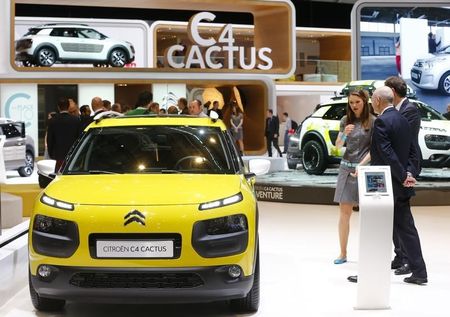By Laurence Frost and Gilles Guillaume
AMSTERDAM (Reuters) - Citroen's C4 Cactus is more than just another compact car. It's a manifesto on wheels for the brand's move down-market as parent PSA Peugeot Citroen struggles to return to profit.
The car, lent to reporters for test drives this week as European sales get underway, sports slightly wacky features including bench seats and rugged-looking squishy plastic "Airbump" exterior door panels developed by BASF.
Amid signs of a mass-consumer shift from driving performance to functionality and technology, Citroen is drawing on its utilitarian French genes expressed in historic models like the 2CV, produced from 1948-1990.
"This is not supposed to be a niche car; it's a vehicle with broad appeal," Citroen product chief Pierre Monferrini said of the new model during a press briefing in Amsterdam.
Under new group Chief Executive Carlos Tavares, the plusher DS lineup - named after another iconic past model - is separating from Citroen to become a standalone premium brand.
That frees Citroen to hone its funky-but-frugal image while stablemate Peugeot tackles mid-market Volkswagen head-on.
Throughout a prolonged European slump, the group has been punished by its costly domestic industrial base and a lack of budget models to counter hot-selling rivals such as the Dacia Duster offroader, built in Romania on Renault's low-cost vehicle architecture.
Paris-based Peugeot recently sold stakes to the French government and Dongfeng Motor Group, raising 3 billion euros ($4.1 billion) to fund its turnaround plan after posting 7.3 billion in losses for the last two years.
In the absence of a dedicated no-frills platform, the Spanish-built C4 Cactus trims costs by using the modified underpinnings of the smaller C3 and Peugeot 208 subcompacts.
Its stretched frame approaches rivals from the larger compact category in length but not engine size. Versions range from 75-110 horsepower, compared with 85-300 for the VW Golf.
But power is not the point, according to Alexandre Malval, Citroen's chief designer.
"Everybody else is trying to express aggressivity and sportiness," Malval said. "We believe that's a bit dated, and Citroen should go its own way."
LOVE 'EM OR HATE 'EM
The pared-down specifications present an odd mix. Electronic tyre gauges and a large touch-screen are standard, but the mechanical handbrake, ignition key and pop-out rear windows are a step back from increasingly common automation.
They also contribute to a 200 kilogram weight saving compared with the existing C4 model - critical to getting a reasonable response from a three-cylinder, 1.2 litre base engine that emits 105 grams of CO2 per kilometre.
It is the quirky protective door panels that stand out most, developed over two years by German chemicals giant BASF to resist scratches, stains and prolonged sun exposure.
"People either love them or hate them, but those side panels are quite a talking point," UBS analyst Philippe Houchois said.
The car's success may, however, be limited because "it's not really low-cost in the way Dacia was initially conceived by Renault", Houchois said.
"Making Citroen stand out is a logical move. What's less clear is whether the cost base can match what the price positioning should be."
At 14,000 euros, the C4 Cactus starting price comes in below mid-market rivals such as the Golf and General Motors' Opel Astra at 17,200, but still well above the Duster's 12,000 euro entry ticket.
The Citroen brand is concentrating production in eastern Europe and Spain as it competes in lower price points. A cheaper update to the Czech-built C1 mini is also launching now.
The next model to get a cheap-and-cheerful makeover may be the C3 subcompact. Its production will shift from France to Slovakia, sources told Reuters last month.
Whether it also bears the distinctive Cactus Airbumps may depend on how close the C4 model comes to filling its Madrid factory's annual production capacity of 200,000 vehicles.
Sales are expected in the 50,000-100,000 range by leading forecasters, with a relatively high degree of unpredictability.

"With the Cactus they're creating a new universe," said Denis Schemoul of consulting firm IHS Automotive. "They are targeting consumers who have lost interest in mainstream cars and their typical features."
($1 = 0.7368 Euros)
(Editing by Will Waterman)
